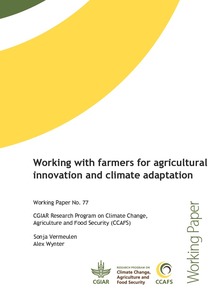Working with farmers for agricultural innovation and climate adaptation
The CGIAR Research Program on Climate Change, Agriculture and Food Security (CCAFS), in common with other CGIAR research programs, understands that farmers are at the centre of agricultural innovation and adaptation. This publication describes some of the many ways in which CCAFS works with farmers and farmers’ organizations to solve problems generated by climate change.





